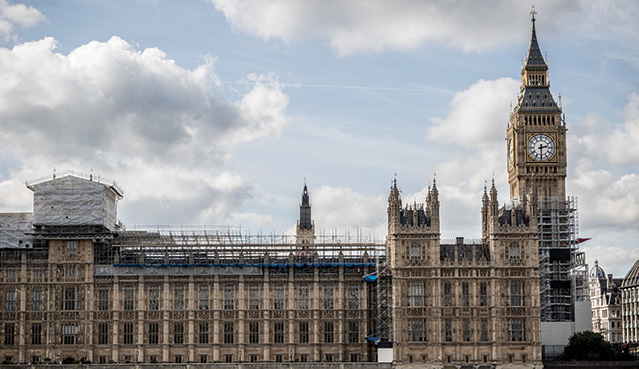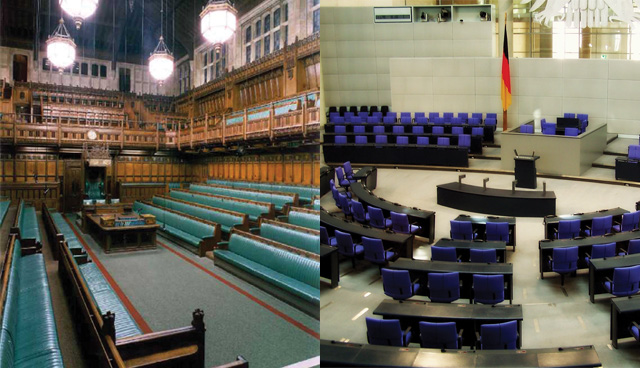Westminster workings set for renovation

A temporary move of business out of the Palace of Westminster could have a permanent effect on how parliamentary business works in future.
In early 2018, 236 to 220 MPs voted to support an amendment that could see MPs ‘temporarily’ relocated outside the Palace of Westminster for up to and potentially beyond seven years.
Although not set to come into full effect until 2025, the move has raised question marks around the long-term impact physical change will have on the current workings of parliament and whether planners should consider reformatting the 19th century building for a more modern approach to government.
MPs agreed en masse for the need for radical refurbishment of the building, where around 60 incidents that could have caused serious fires in the last decade, Indeed, it is understood that some existing wiring and plumbing in the building dates from 1870.
While there was a mixture of proposals on how the renovations should be handled, with some MPs opting for a phased approach to allow parliament to remain in the building, in the end MPs opted for the cheapest option to temporarily vacate the building with an estimated cost of £3.5 billion.
An ‘Olympic-style’ Delivery Authority and Sponsor Board are being established to manage the work which will see the relocation of 650 MPs, 800 peers and around 6,000 staff currently operating in Westminster.
The Commons will move into Richmond House on Whitehall, using a covered courtyard as the debating chamber. Meanwhile, the Lords will move to the Queen Elizabeth II conference centre. With office space already constrained in the location of the new dwellings, it is expected that many MPS will have to locate much further from parliamentary operations than they are used to. However, it’s worth noting that not all politicians and staff have offices in in the Palace of Westminster and those in more modern buildings are unlikely to have to shift.

The first question this raises is around accessibility. Some have argued that the shift could be the prompt that parliament needs to modernise voting procedures for MPs and peers. It’s possible that given the distance between the chamber and their office, politicians could advocate for the provision to vote remotely. This argument extends further when you consider an already existing push by some, MPs especially, to be facilitated to spend more time in their constituencies.
Distance could also play a factor in changing the current working relationship dynamic in a number of areas. Firstly, a separation of the Lords and the Commons. In separate buildings and with separate security cordons, it’s unlikely that MPs and Peers, as well as their staff, will cross each other’s path as much.
Some will argue that this disruption will be minimal, citing the long-held belief that the real business of politics is done in the out of hours facilities surrounding the chambers. However, these are also set to change. While it’s understood that planners have been given a brief to retain as much as possible those social outlets where politicians engage on a more informal business, any solutions will require a fresh location. Lobbying is also set to be disrupted with expectation that dining rooms, usually utilised for parliamentary liaison, will not be accommodated for in any new plans.
While the integral details which make up the current workings of Parliament are set to undergo a test of sustainability under change, there have also been those advocating the potential to explore radical reform. For example, it has been mooted that the ceremonious State Opening of Parliament would look out of place amidst a modern conference centre, potentially signalling the end to the procedure.
Similarly, some argue for the radical step of re-shaping any refurbished chamber to reflect a more modern make up of politics in the UK. Traditionally, the Commons’ shape reflects a two-sided approach to politics, the Government vs the opposition. However, other working examples exist such as the hemicycle (a horseshoe-shaped, debating chamber) which is utilised in Scotland, the Bundestag and the US Congress.
If reconfiguring the shape of the chamber, planners will also be forced to assess its size and the demand for space. While Brexit debates have facilitated the beaming out if images where standing room only exists in the House of Commons, on most occasions the chamber is sparsely populated. This opens up the potential for the creation of various chambers. One potential put forward is a much smaller chamber for day-to-day business and the existence of a much larger chamber when demand dictates it.
All these considerations are likely to be debated prior to the beginning of work, however, there must also be an onus to do so. Seven years of a different way of working will inevitably change the status quo. A renovated Westminster Palace must be able to accommodate these changes.





